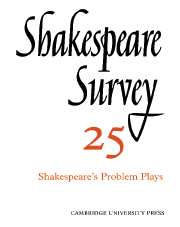Book contents
- Frontmatter
- The Problem Plays, 1920–1970: A Retrospect
- ‘Sons and Daughters of the Game’: An Essay on Shakespeare’s ‘Troilus and Cressida’
- The Options of the Audience: Theory and Practice in Peter Brook’s ‘Measure for Measure’
- Man’s Need and God’s Plan in ‘Measure for Measure’ and Mark iv
- The Design of ‘All’s Well That Ends Well’
- Directing Problem Plays: John Barton Talks to Gareth Lloyd Evans
- The Queen Mab Speech in ‘Romeo and Juliet’
- ‘Time’s Deformed Hand’: Sequence, Consequence, and Inconsequence in ‘The Comedy of Errors’
- Faith and Fashion in ‘Much Ado About Nothing’
- ‘The Merry Wives of Windsor’ as a Hallowe’en Play
- ‘The Tempest’ at the Turn of the Century: Cross-Currents in Production
- Variations Within A Source: From Isaiah XXIX To ‘The Tempest’
- The Life of George Wilkins
- A Neurotic Portia
- Of an Age and for All Time: Shakespeare at Stratford
- The Year's Contributions to Shakespearian Study 1 Critical Studies
- 2 Shakespeare’s Life, Times, and Stage
- 3 Textual Studies
- Index
- Plate section
‘Sons and Daughters of the Game’: An Essay on Shakespeare’s ‘Troilus and Cressida’
Published online by Cambridge University Press: 28 March 2007
- Frontmatter
- The Problem Plays, 1920–1970: A Retrospect
- ‘Sons and Daughters of the Game’: An Essay on Shakespeare’s ‘Troilus and Cressida’
- The Options of the Audience: Theory and Practice in Peter Brook’s ‘Measure for Measure’
- Man’s Need and God’s Plan in ‘Measure for Measure’ and Mark iv
- The Design of ‘All’s Well That Ends Well’
- Directing Problem Plays: John Barton Talks to Gareth Lloyd Evans
- The Queen Mab Speech in ‘Romeo and Juliet’
- ‘Time’s Deformed Hand’: Sequence, Consequence, and Inconsequence in ‘The Comedy of Errors’
- Faith and Fashion in ‘Much Ado About Nothing’
- ‘The Merry Wives of Windsor’ as a Hallowe’en Play
- ‘The Tempest’ at the Turn of the Century: Cross-Currents in Production
- Variations Within A Source: From Isaiah XXIX To ‘The Tempest’
- The Life of George Wilkins
- A Neurotic Portia
- Of an Age and for All Time: Shakespeare at Stratford
- The Year's Contributions to Shakespearian Study 1 Critical Studies
- 2 Shakespeare’s Life, Times, and Stage
- 3 Textual Studies
- Index
- Plate section
Summary
Of all Shakespeare, Troilus and Cressida is our play. It could be rediscovered only by a sensibility tuned to artistic discontinuity and preoccupied with the realities of love and war; and so it had to wait for cubism and atonality, for fascism and Freud. So given over to ‘philosophy’ and debate, it had to wait for Shaw to rescue this dramatic mode, and probably for the kind of painstaking analysis of texts apart from performance that modern criticism has indulged. In a narrower sense, it is our play because it makes sense to Americans in the 1970s. We know, albeit still in a remote and mostly vicarious way, the meaning of a protracted seven years’ war. We know how the designs of war fail in their promised largeness and how the Greeks must have felt tented in a foreign land, so many hollow factions, with their great engine Achilles useless in seeming mockery of their very designs. Like the Trojans, too, we have heard endlessly the arguments for carrying on a war of doubtful justification, and we know what it really means to settle only for an ‘honorable peace’. We have seen good men who spoke truth in council, even in public, suddenly capitulate to save the corporate image. Within the walls of our capital cities — or more accurately, in their gilded suburbs — we may observe an elegant and seething triviality to match the palace society of Troy. Last and worst, we know what this society and its war has done to our best youth — those not literally destroyed have suffered a degradation of spirit, and of those whose ideals are not fully corrupted, many have chosen a life of irreconcilable alienation. There is no doubt, Troilus and Cressida gives back our own world.
- Type
- Chapter
- Information
- Shakespeare Survey , pp. 11 - 26Publisher: Cambridge University PressPrint publication year: 1972
- 2
- Cited by



